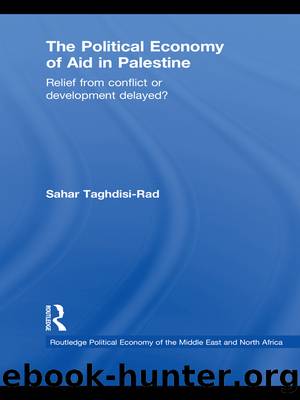The Political Economy of Aid in Palestine: Relief From Conflict or Development Delayed? by Sahar Taghdisi-Rad

Author:Sahar Taghdisi-Rad [Taghdisi-Rad, Sahar]
Language: eng
Format: epub
Tags: International Relations, Public Policy, Economic Conditions, Economics, Developing & Emerging Countries, Social Science, Political Science, Business & Economics, Economic Policy, General, Regional Studies
ISBN: 9781136918414
Google: LvUtCgAAQBAJ
Goodreads: 17583536
Publisher: Routledge
Published: 2010-10-04T00:00:00+00:00
Palestine Shippersâ Council
In 2005, in response to a PA request, UNCTAD in association with PalTrade launched a project to assist Palestinian traders and shippers in establishing a Palestinian Shippersâ Council (PSC). The PSC and its half a million dollar budget aimed to support and promote the interests of Palestinian shippers, representing them in dealings with transport providers, relevant PA authorities, and regional and international bodies. The PSC, whose works are often co-ordinated with organisations such as the Peres Centre and Israeli Shippersâ Council who emphasise the significance of re-establishing PalestinianâIsraeli trade links, also aims to acknowledge that the Palestinian business sector has an important role in leading co-operation with parallel Israeli sectors. The initiative states that it seeks to âencourage interaction between the Palestinian and Israeli private sectors, which have the potential to serve as anchors of dialogue in their respective communitiesâ (Changemakers, 2006). With the aim of improving Palestinian trade relations with Israel, something which has been recognised as one of the ills of Palestinian economic history in recent decades, the PSC provides services and represents the âinterests of Palestinian importers and exportersâ that utilise maritime shipping, air freight or land transport. UNCTAD believes that the PSC initiative contributes to âmanaging conflict as it diffuses disparities between the Israeli and Palestinian business communities and encourages cooperation between Israeli and Palestinian organisations, authorities and individualsâ (Changemakers, 2006).
The roles and services of the PSC are similar to shippersâ councils in other countries, with the difference that the Palestinian economy and trade is included in the Israeli âcustoms envelopeâ. Under the quasi-customs union dictated by the Paris Protocol, all Palestinian import and export activities go through the Israeli customs system. This is at a time when most Palestinian businesses do not have access to, or knowledge of, Israeli customs regulations and logistical services. This information asymmetry in turn reduces the competitiveness of Palestinian traders. Another difference between the PSC and the conventional shippersâ councils of other countries is that in most cases, the shippersâ councils are established with government support or at least, through co-operation with the government, whereas the PSC has been established entirely through civil society co-operation with no co-ordination with the PA. Despite the establishment of the Council amidst the uncompetitive economic environment, the drive to re-establish trading links with Israel is a contradictory move given the long destructive legacy of dependence on Israel as the main trading partner for Palestine (Changemakers, 2006).
The first year of this project established the legal framework of the Council and trained its staff and members through various training workshops and study tours to enable employees, with the aim of managing the PSC as a âone-stop shopâ which facilitates membersâ negotiating skills and knowledge of modern transport operations, customs brokerage work, port- and border-crossing operations, and tariff duties and regulations. During its second year of setting up, the project aimed at providing advanced training activities and the establishment of tailor-made services for the PSC members (UNCTAD, 2005).
Download
This site does not store any files on its server. We only index and link to content provided by other sites. Please contact the content providers to delete copyright contents if any and email us, we'll remove relevant links or contents immediately.
Managing Business Ethics by unknow(498)
Incentives and Prosocial Behavior by Incentives & Prosocial Behavior(421)
Reframing Difference in Organizational Communication Studies: Research, Pedagogy, and Practice by Dennis K. Mumby (editor)(359)
Financial Markets, Public Policy, and the East Asian Miracle by Financial Markets Public Policy & the East Asian Miracle(322)
The 21 Irrefutable Truths of Trading: A Trader's Guide to Developing a Mind to Win by John Hayden(290)
Handbook of Intercultural Communication and Cooperation (9783666403279) by Unknown(287)
Human Security in Turkey by Alpaslan Özerdem Füsun Özerdem(277)
Fandom Analytics by Michael Lewis(276)
How the World Became Rich: The Historical Origins of Economic Growth by Mark Koyama & Jared Rubin(270)
Guns of the World by Unknown(257)
Inheritance and Wealth Inequality in Britain by Harbury Colin;Hitchins David;(249)
Asset Integrity Management Systems a Complete Guide - 2020 Edition (9780655989844) by Blokdyk Gerardus(246)
Food Security, Affordable Housing, and Poverty by Ahmet Suayb Gundogdu(246)
Beyond Positivism, Behaviorism, and Neoinstitutionalism in Economics by Deirdre Nansen McCloskey(243)
Creative problem solving for managers by Developing Skills for Decision Making & Innovation(237)
The Way of the Wall Street Warrior by Dave Liu & Adam Snyder(236)
The Delusions of Economics by Gilbert Rist;(217)
Diminishing Returns by Mark Blyth(216)
The Inclusion Toolbox by Jennifer A. Kurth & Megan Gross(211)
